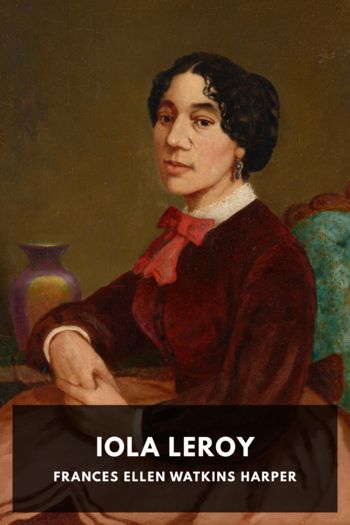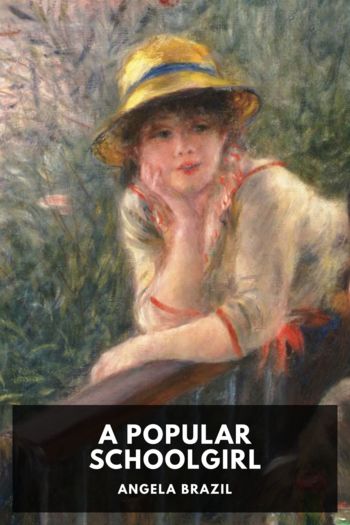Iola Leroy, Frances Ellen Watkins Harper [read aloud books .txt] 📗

- Author: Frances Ellen Watkins Harper
Book online «Iola Leroy, Frances Ellen Watkins Harper [read aloud books .txt] 📗». Author Frances Ellen Watkins Harper
Mr. Bascom hesitated.
“I am not asking you as a matter of idle curiosity, but as a physician. I must have all the light I can get in making my diagnosis of the case.”
The principal arose, went to his desk, took out the letter which he had picked up from the floor, and laid it in the physician’s hand. As the doctor read, a look of indignant horror swept over his face. Then he said: “Can it be possible! I never suspected such a thing. It must be a cruel, senseless hoax.”
“Doctor,” said Mr. Bascom, “I have been a lifelong Abolitionist and have often read of the cruelties and crimes of American slavery, but never before did I realize the low moral tone of the social life under which such shameless cruelties could be practiced on a defenseless widow and her orphaned children. Let me read the letter again. Just look at it, all tear-blotted and written with a trembling hand:—
‘Dear Brother:—I have dreadful news for you and I hardly know how to tell it. Papa and Gracie are both dead. He died of yellow fever. Mamma is almost distracted. Papa’s cousin has taken possession of our property, and instead of heirs we are chattels. Mamma has explained the whole situation to me. She was papa’s slave before she married. He loved her, manumitted, educated, and married her. When he died Mr. Lorraine entered suit for his property and Judge Starkins has decided in his favor. The decree of the court has made their marriage invalid, robbed us of our inheritance, and remanded us all to slavery. Mamma is too wretched to attempt to write herself, but told me to entreat you not to attempt to come home. You can do us no good, and that mean, cruel Lorraine may do you much harm. Don’t attempt, I beseech you, to come home. Show this letter to Mr. Bascom and let him advise you what to do. But don’t, for our sake, attempt to come home.
‘Your heartbroken sister,
‘Iola Leroy.’ ”
“This,” said the doctor, “is a very awkward affair. The boy is too ill to be removed. It is doubtful if the nerves which have trembled with such fearful excitement will ever recover their normal condition. It is simply a work of mercy to watch over him with the tenderest care.”
Fortunately for Harry he had fallen into good hands, and the most tender care and nursing were bestowed upon him. For awhile Harry was strangely silent, never referring to the terrible misfortune which had so suddenly overshadowed his life. It seemed as if the past were suddenly blotted out of his memory. But he was young and of an excellent constitution, and in a few months he was slowly recovering.
“Doctor,” said he one day, as the physician sat at his bedside, “I seem to have had a dreadful dream, and to have dreamt that my father was dead, and my mother and sister were in terrible trouble, but I could not help them. Doctor, was it a dream, or was it a reality? It could not have been a dream, for when I fell asleep the grass was green and the birds were singing, but now the winds are howling and the frost is on the ground. Doctor, tell me how it is? How long have I been here?”
Sitting by his bedside, and taking his emaciated hand in his, the doctor said, in a kind, fatherly tone: “My dear boy, you have been very ill, and everything depends on your keeping quiet, very quiet.”
As soon as he was strong enough the principal gave him his letter to read.
“But, Mr. Bascom,” Harry said, “I do not understand this. It says my mother and father were legally married. How could her marriage be set aside and her children robbed of their inheritance? This is not a heathen country. I hardly think barbarians would have done any worse; yet this is called a Christian country.”
“Christian in name,” answered the principal. “When your father left you in my care, knowing that I was an Abolitionist, he confided his secret to me. He said that life was full of vicissitudes, and he wished you to have a good education. He wanted you and your sister to be prepared for any emergency. He did not wish you to know that you had negro blood in your veins. He knew that the spirit of caste pervaded the nation, North and South, and he was very anxious to have his children freed from its depressing influences. He did not intend to stay South after you had finished your education.”
“But,” said Harry, “I cannot understand. If my mother was lawfully married, how could they deprive her of her marital rights?”
“When Lorraine,” continued Mr. Bascom, “knew your father was dead, all he had to do was to find a flaw in her manumission, and, of course, the marriage became illegal. She could not then inherit property nor maintain her freedom; and her children followed her condition.”
Harry listened attentively. Things which had puzzled him once now became perfectly clear. He sighed heavily, and, turning to the principal, said: “I see things in a new light. Now I remember that none of the planters’ wives ever visited my mother; and we never went to church except when my father took us to the Cathedral in New Orleans. My father was a Catholic, but I don’t think mamma is.”
“Now, Harry,” said the principal, “life is before you. If you wish to stay North, I will interest friends in your behalf, and try to get you a situation. Going South is out of the question. It is probable that by this time your mother and sister are removed from their home. You are powerless to fight against the law that enslaved





Comments (0)